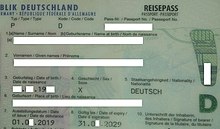Third gender law (Germany)
| Third gender law | |
|---|---|
| |
| Citation | 18 December 2018, Federal Law Gazette I page 2635 |
| Territorial extent | Germany |
| Effective | 22 December 2018 (5 years ago) |
| Status: In force | |

Germany's third gender law introduced the gender "diverse" (German: divers) as a third option in alternative to "female" and "male" in the German civil status register.[1]
The law, codified in § 45b PStG (Personenstandsgesetz), laid down an administrative procedure for assigning a diverse gender. It requires a doctor's note confirming "a variant of sex development". The diverse gender can be assigned to people listed in the register, at birth or later in life. When individuals change their legal gender later in life, they can also change their first name.[2]
The administrative process is officially aimed at intersex people, but nonbinary people (who were not intersex) have also tried to use it, due to its manageable burden compared to the gender entry change procedure for trans people (Transsexuellengesetz). However, the Federal Court of Justice ruled on 22 April 2020 that § 45b could not be used by a nonbinary person who was not intersex.[3]
The third gender law took effect on 22 December 2018. A bill to ease the process for transgender, intersex and non-binary non-intersex people, the Self-Determination Act, was passed on April 12, 2024, and is set to take effect in November 2024.
Legislative history[edit]
Germany got a third gender option because, on 10 October 2017, the Federal Constitutional Court's ruled that it was constitutionally necessary. The court decided that it was unconstitutional to refuse a third gender option for people "not clearly identifiable" as female or male,[4][5] citing Articles 1, 2, and 3 of the German constitution.[6] This ruling came in response to a constitutional complaint by Vanja, an at the time 26-year-old intersex person from Leipzig. Vanja had sued his[7] way up to the constitutional court.[8]
The constitutional court ruling for the right to a third gender came shortly after federal elections in 2017. The elections led to the formation of a grand coalition of Christian Democrats, Social Democrats and the Christian Social Union. The coalition agreement was signed on 12 March 2018, and Horst Seehofer (Christian Social Union) became minister of the interior.[9]
Minister Seehofer's legal draft provided for the third gender to be called "other" (anderes). However, justice minister Katarina Barley and family minister Franziska Giffey, both of the social democrats, blocked this proposal. In their view, "other" was disparaging. Barley favoured "further" (weiteres) while Giffey preferred "inter/diverse" (inter/divers).[10]
The government draft, hashed out within the grand coalition, settled on a third gender entry called divers, as well as an option for an empty gender entry.[9]
Trivia[edit]

In 2021, an online form created to book covid vaccination appointments around Cologne and Dusseldorf[11] mistakenly offered users to declare their gender as Taucher, a literal translation of the English "divers" as in "people who dive". The booking form was made by the regional public doctors' association Kassenärztliche Vereinigung Nordrhein.[12][13]
See also[edit]
- Legal recognition of intersex people
- Legal recognition of non-binary gender
- Intersex rights in Germany
- Transgender rights in Germany
References[edit]
- ^ "Male – Female – Diverse: The "third option" and the General Act on Equal Treatment". Antidiskriminierungsstelle. Retrieved 2022-11-13.
- ^ "Ratgeber für inter- und transgeschlechtliche Menschen". www.lsvd.de. Retrieved 2019-04-02.
- ^ "BGH verwehrt nicht-binärer Person die Streichung des Geschlechtseintrags nach § 45b PStG und verweist auf TSG – TrIQ: "Der Beschluss ist viel Kritik wert" – TransInterQueer e.V." (in German). Retrieved 2022-11-14.
- ^ BVerfG, Beschluss vom 10. Oktober 2017 - 1 BvR 2019/16
- ^ Entwurf eines Gesetzes zur Änderung der in das Geburtenregister einzutragenden Angaben BT-Drs. 19/4669 vom 1. Oktober 2018.
- ^ Bundesverfassungsgericht, 1 Senat (2017-10-10). "Bundesverfassungsgericht - Decisions - Civil status law must allow a third gender option". www.bundesverfassungsgericht.de. Retrieved 2022-11-14.
{{cite web}}: CS1 maint: numeric names: authors list (link) - ^ "Artikel 3 des Grundgesetzes: Wie Vanja die Behörden auf das "dritte Geschlecht" gebracht hat". Der Tagesspiegel Online (in German). 2019-05-23. ISSN 1865-2263. Retrieved 2022-12-27.
mittlerweile zieht er ein männliches Bild von sich vor.
- ^ "When 'male' or 'female' is insufficient – DW – 09/03/2016". dw.com. Retrieved 2022-12-27.
- ^ a b "Vorgang - Gesetzgebung. Gesetz zur Änderung der in das Geburtenregister einzutragenden Angaben. 19. Wahlperiode". Bundestag DIP. Retrieved 2022-12-27.
- ^ "Drittes Geschlecht: Barley und Giffey blockieren Horst Seehofers Entwurf". Der Spiegel (in German). 2018-05-19. ISSN 2195-1349. Retrieved 2022-12-27.
- ^ KVNO (2022-12-27). "Die KV Nordrhein stellt sich vor | Karriere". kvno-karriere (in German). Retrieved 2022-12-27.
- ^ "Corona-Impfung: Skurrile Panne! "Taucher" als Geschlecht wählbar - und viele schmunzeln, wenn sie die Erklärung hören". www.tz.de (in German). Retrieved 2022-12-27.
- ^ heute-show (2021-02-05). "Peinliche Panne bei der Impftermin-Buchung". www.facebook.com. Retrieved 2022-12-27.


 French
French Deutsch
Deutsch

